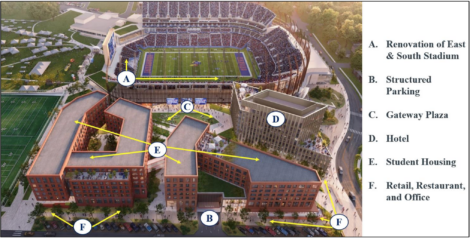KU gave unique rights deal to Fritzel despite fraud investigation being underway

photo by: Nick Krug
Thomas Fritzel takes a drink of his soda as he watches the action during the KU men's basketball game against Oklahoma on Saturday, Jan. 26, 2013 at Allen Fieldhouse.
The University of Kansas on Friday provided an explanation of why it gave a booster the rights to prominently use the Jayhawk name and brand despite the fact that he was actively being investigated for fraud.
That booster, Lawrence developer Thomas Fritzel, was indicted by federal prosecutors on Wednesday for an alleged scheme to defraud the city of Lawrence and for allegedly flouting environmental regulations as part of his construction business.
Fritzel faces both prison time and potentially more than $1 million in fines if he is convicted on all counts. In the meantime, he’ll continue to benefit from a unique partnership with KU that allows him wide use of the iconic Jayhawk name, brand and image to promote The Jayhawk Club, a golf and country club Fritzel operates in west Lawrence.
The university and Fritzel announced the partnership in February 2017, more than a year before Fritzel was indicted. However, KU officials at the time of entering into the partnership knew that Fritzel was under investigation by the city of Lawrence for fraud.
In December 2015, the city of Lawrence announced it was demanding $500,000 from Fritzel and his entities related to the The Oread hotel, after an outside auditor had found Fritzel had filed improper sales tax returns in order to get unwarranted sales tax rebates from the city of Lawrence and Douglas County. The city-hired auditor stated it was likely that several of Fritzel’s actions had violated the law. The city had pledged to cooperate with any relevant authorities on potential criminal matters.
The federal fraud indictment issued this week stems from the city of Lawrence’s investigation.
On Friday, a KU spokesman said the university was comfortable, at the time, with the naming deal for The Jayhawk Club, which formerly operated as the Alvamar Country Club.
“The university does due diligence before engaging in partnerships with external entities, and based on what was publicly known at that time, we were comfortable granting naming rights to the club,” KU spokesman Joe Monaco said. “Alvamar Country Club had been a great home for the university’s men’s and women’s golf programs, and there had been a terrific partnership between the club and the university during that time. The new license agreement was an extension of that partnership that we determined would benefit The Jayhawk Club, the university, our student-athletes and the entire region.”
It isn’t clear whether the agreement KU has with Fritzel will allow KU to cancel the agreement in the event that Fritzel is convicted of the federal charges. When asked, Monaco pointed to a general provision in the agreement that states the agreement could be invalidated if Fritzel does anything during the term of the agreement to “bring into disrepute the reputation or goodwill” associated with the Jayhawk brand. Technically, the alleged fraud activity by Fritzel is thought to have occurred not during the term of the agreement but rather prior to the deal with KU, which was signed on Oct. 1, 2016.
The agreement is for 20 years. It allows the club to use KU’s marks and names for an annual fee of $120,000 for the first 10 years. During the final 10 years of the agreement, the amount is adjusted for inflation. At the time, KU called the deal unique. While the university frequently signs licensing deals that allow the Jayhawk to be used on shirts, hats and other merchandise, the deal with Fritzel is believed to be perhaps the only time KU has licensed the Jayhawk name and mascot to a privately owned business.
The agreement with The Jayhawk Club is just one of several that KU has with Fritzel. Kansas Athletics Inc. and the KU Endowment Association have multiple agreements with Fritzel entities related to Rock Chalk Park, the sports complex in northwest Lawrence that a for-profit Fritzel firm owns.
As part of the Rock Chalk Park deal, KU could be tied to Fritzel and his enterprises for potentially another 40 years. Kansas Athletics has lease agreements with Fritzel for a track and field stadium, softball facility and soccer venue at Rock Chalk Park.
Monaco said it was too early for KU to determine whether the Rock Chalk Park deal would be affected if Fritzel were convicted on any of the federal charges.
In May, the Journal-World reported on an unusual set of negotiations that occurred between Fritzel and Kansas Athletics Inc. In October 2012, Kansas Athletics signed a Rock Chalk Park lease agreement with a Fritzel entity that had favorable terms for KU. Specifically, the lease gave Kansas Athletics complete control over whether KU would continue to use the Rock Chalk Park facilities after the initial 30-year lease term is completed.
The lease gave KU considerable leverage to negotiate two 10-year extensions of the Rock Chalk Park facility. Importantly, if KU didn’t like the terms of the lease extensions, it could simply walk away from the project.
But just a few months after that lease was signed, Kansas Athletics voluntarily voided the lease at the request of Fritzel. A new lease was signed that removed KU’s ability to reject the two 10-year extensions. Under the new lease, Fritzel can force Kansas Athletics to accept the extensions and at a lease rate that hasn’t yet been determined. The lease calls for KU to pay a fair market value rate for the facilities, which will be determined, in part, by Fritzel. Based on current rates, the lease extensions could obligate Kansas Athletics to more than $40 million in additional lease payments.
When the Journal-World questioned Kansas Athletics officials about why KU agreed to the changes, an official in May said the change was “made in fairness to the landlord” after Fritzel had expressed concern that the original lease wouldn’t make him whole. On Friday, Kansas Athletics further elaborated and said it believed the change in terms would put Kansas Athletics in a better position if it chooses to stay at Rock Chalk Park past the 50-year lease term.
The Journal-World asked in May about the process that was used to void the lease and create a new one. Specifically, the Journal-World sought to find out whether the Kansas Athletics Inc. board approved the lease. Kansas Athletics Inc. is a nonprofit corporation that is governed by a board of university officials. After not receiving a response in May, the Journal-World asked that question again this week.
Jim Marchiony, a spokesman for Kansas Athletics, on Friday provided information that confirmed the Kansas Athletics Inc. board did not approve the lease.
He said the board in 2011 had approved a standing resolution that gave then-Athletic Director Sheahon Zenger the ability to approve contracts and purchases, even if they are greater than $250,000. Without the resolution, it appears the board would have been required to approve the lease.
It is not clear, however, why the decision was made to not receive board approval for the lease that potentially obligates Kansas Athletics to more than $100 million in lease payments over a 50-year period.
But Marchiony did say that board members were told of the need to revise the original 2012 lease, and that details of the revised lease were shared with the board, although it was done in a closed-door executive session.
Zenger, who signed the lease, is no longer with Kansas Athletics. Chancellor Douglas Girod, who began his tenure after the Rock Chalk Park deal, fired Zenger in May after finding that the athletic department had lost positive momentum.
Have news tips or story ideas?
• Get in touch with the Journal-World by emailing news@ljworld.com or calling 785-832-6362.







